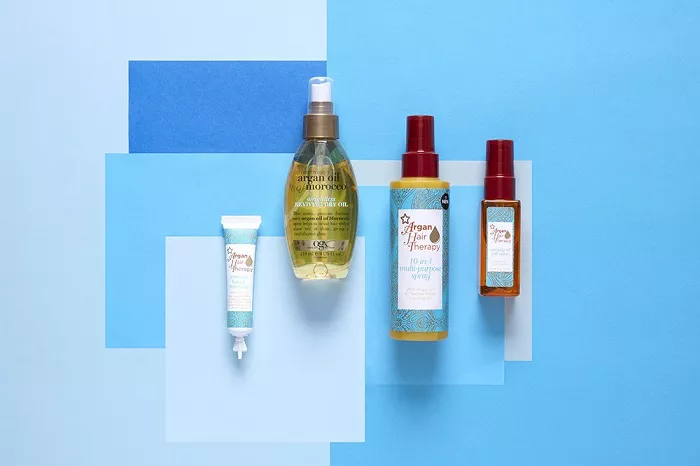Dry and damaged hair is more than a cosmetic issue—it’s a clear signal that your hair is lacking essential nutrients and moisture. Whether caused by environmental stressors like harsh weather and pollution, or by frequent heat styling, dryness can leave hair dull, brittle, and difficult to manage. Fortunately, natural oils offer a time-honored and effective solution. These oils deliver deep hydration, improve scalp health, and enhance hair texture and shine.
This professionally curated guide highlights the 10 best hair oils known to repair, nourish, and revitalize dry and damaged hair. From centuries-old remedies to modern-day elixirs, these oils support long-term hair health and resilience.
Argan Oil
Often referred to as “liquid gold,” argan oil is extracted from Moroccan argan trees. Rich in vitamin E and essential fatty acids, it provides intense hydration without greasiness. It helps tame frizz, restore shine, and soften dry strands—making it a top choice for smoothing and revitalizing hair.
Coconut Oil
A classic staple in many households, coconut oil penetrates deep into the hair shaft, preventing protein loss and reinforcing the hair’s natural structure. It is highly effective in reducing breakage, improving softness, and shielding hair from environmental stress.
Jojoba Oil
Jojoba oil closely mimics the scalp’s natural sebum, making it a gentle yet effective moisturizer. It hydrates dry strands, reduces scalp flakiness, and strengthens hair without leaving a greasy residue. Lightweight and non-comedogenic, it’s perfect for regular use.
Olive Oil
Loaded with antioxidants and vitamins A and E, olive oil seals in moisture and smooths hair cuticles. This oil helps reduce split ends and boosts manageability, making hair appear healthier and more vibrant with consistent use.
Almond Oil
High in magnesium, vitamin E, and omega fatty acids, almond oil supports hair health by nourishing the scalp and reducing dryness. It’s especially useful for treating split ends and brittle hair, leading to stronger, shinier locks.
Castor Oil
Castor oil is a thick, intensely nourishing oil frequently used in Ayurvedic hair care. Its high ricinoleic acid content boosts scalp circulation, promotes hair growth, and helps repair severely damaged hair. This oil is best used mixed with lighter oils for easier application.
Curry Leaves Infused Coconut Oil
This traditional Indian remedy combines the benefits of coconut oil with curry leaves. The infusion strengthens roots, combats hair fall, and improves scalp condition. Curry leaves also help reduce premature greying, making this treatment ideal for comprehensive scalp care.
Amla Oil
Derived from Indian gooseberry, amla oil is packed with vitamin C and antioxidants. It deeply conditions the scalp, enhances shine, and promotes thick, strong hair. Regular application can help reverse dullness and improve overall hair health tips.
Moroccan Oil
Moroccan oil is a powerful blend featuring argan oil and other nourishing ingredients. It provides hydration to dry scalps and protects against heat and humidity. Known for adding instant smoothness and luminosity, it’s a favorite in styling routines.
Rosemary Essential Oil
This essential oil is celebrated for its hair growth-stimulating properties. When diluted with carrier oils such as coconut or jojoba, it strengthens brittle strands and increases blood circulation to the scalp. Rosemary oil also helps reduce breakage and supports long-term hair health advice.
Frequently Asked Questions (FAQs)
Q: How often should I oil dry hair?
A: For dry hair, oiling 3–4 times per week is recommended. Leave the oil on for at least an hour or overnight for deeper nourishment.
Q: Which oils are best for growth and repair?
A: Castor oil and rosemary essential oil are ideal for promoting growth, while argan and virgin coconut oil help repair damage effectively.
Q: Can I mix different oils for better results?
A: Absolutely. Blending oils like almond, castor, and coconut can target multiple hair concerns simultaneously, enhancing the benefits.
Q: Should oil be warmed before applying?
A: Slightly warming the oil can aid absorption. Ensure it is comfortably warm—not hot—to avoid scalp irritation.
Q: How can I remove thick oils like castor oil?
A: Use a sulfate-free shampoo and rinse thoroughly. A second wash may be needed to fully eliminate residue.
Q: Can essential oils be used directly on hair?
A: No. Essential oils must always be diluted with a carrier oil to prevent irritation or allergic reactions.
Related Topics:
- Serums and Scrubs Drive Rapid Growth in US Scalp Care Market
- 4 Homemade Hair Oils for Every Hair Type: Essential Hair Health Tips
- Hard Water Hair Damage? Expert Tips for Healthy Hair Care


